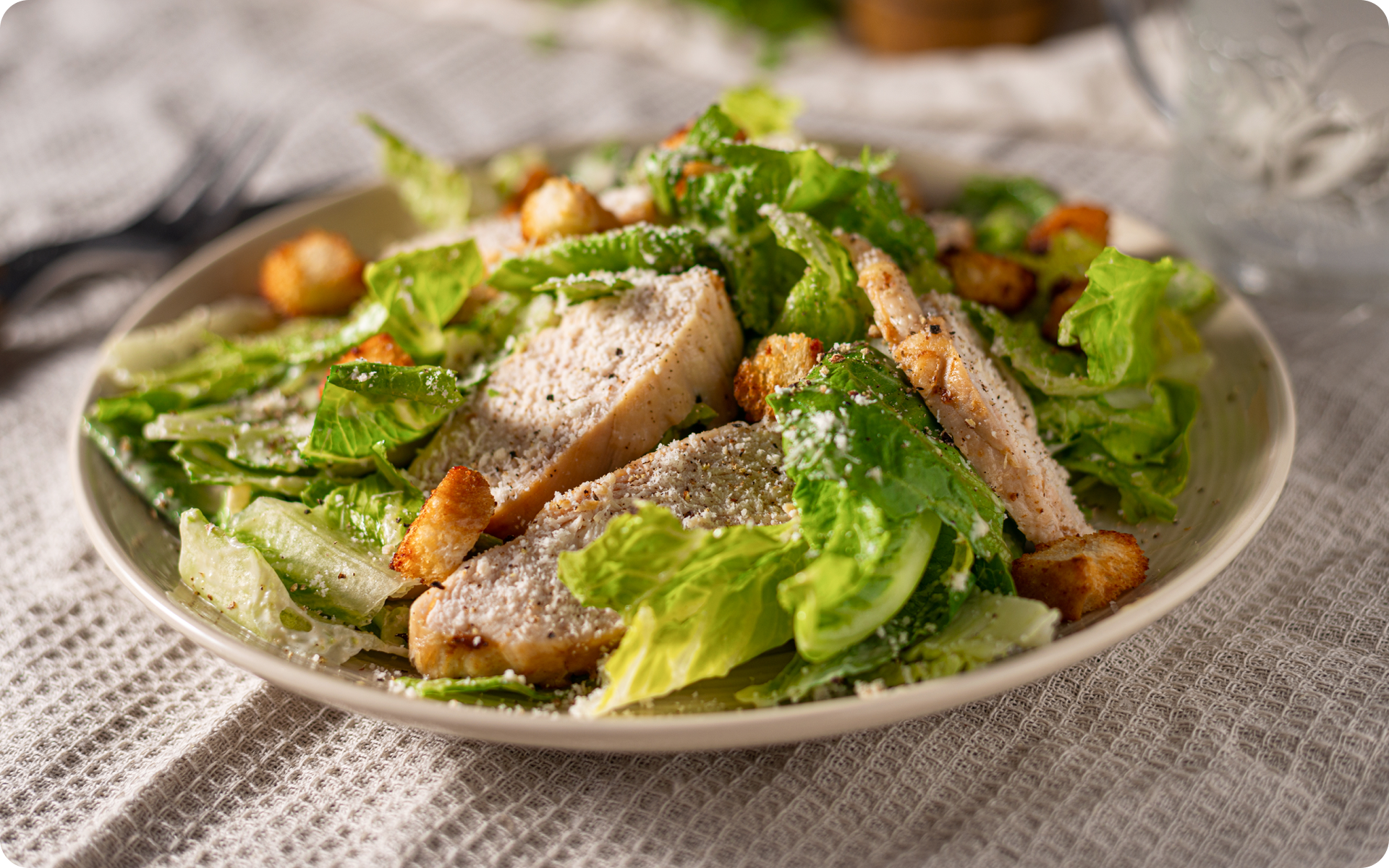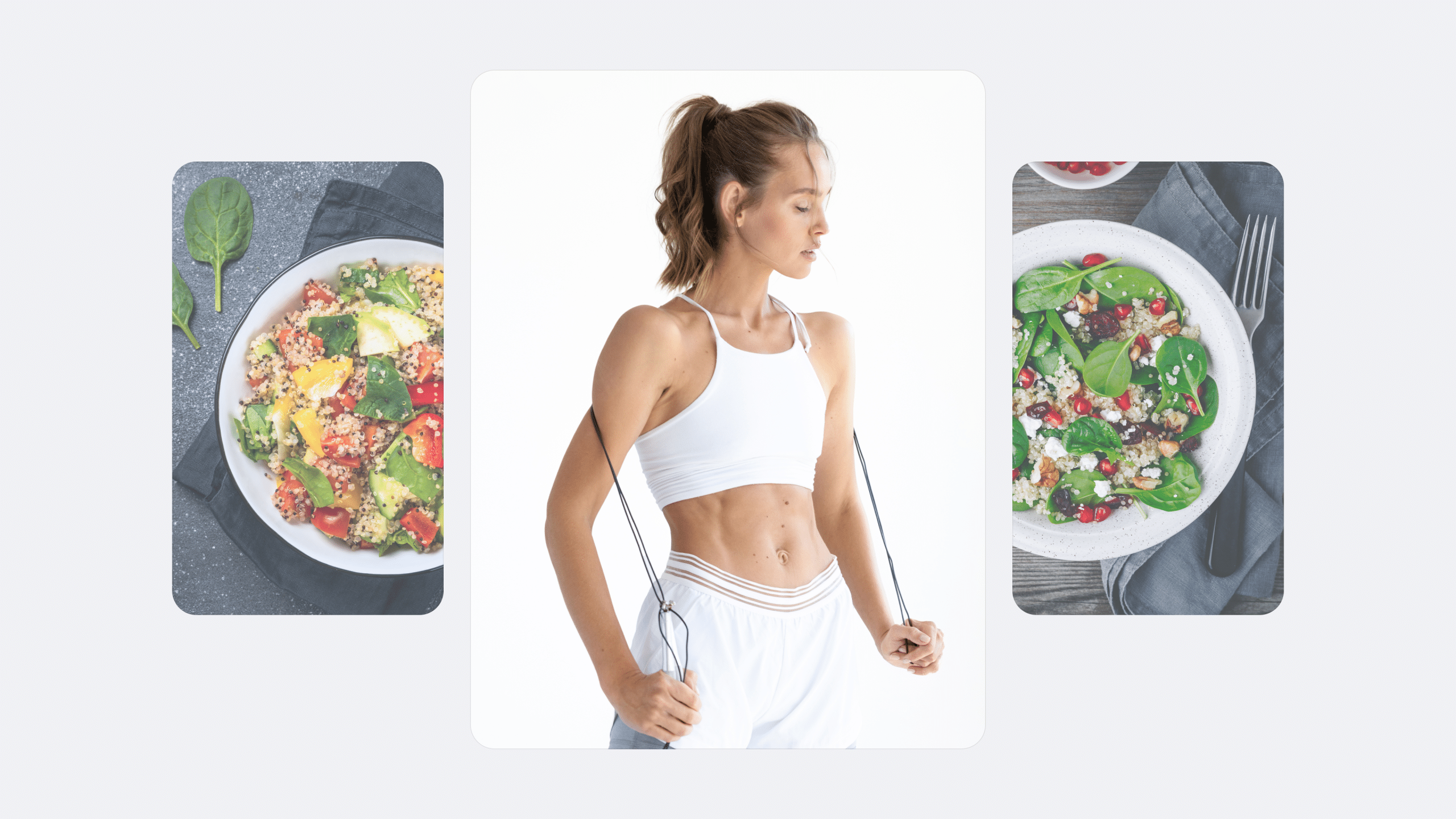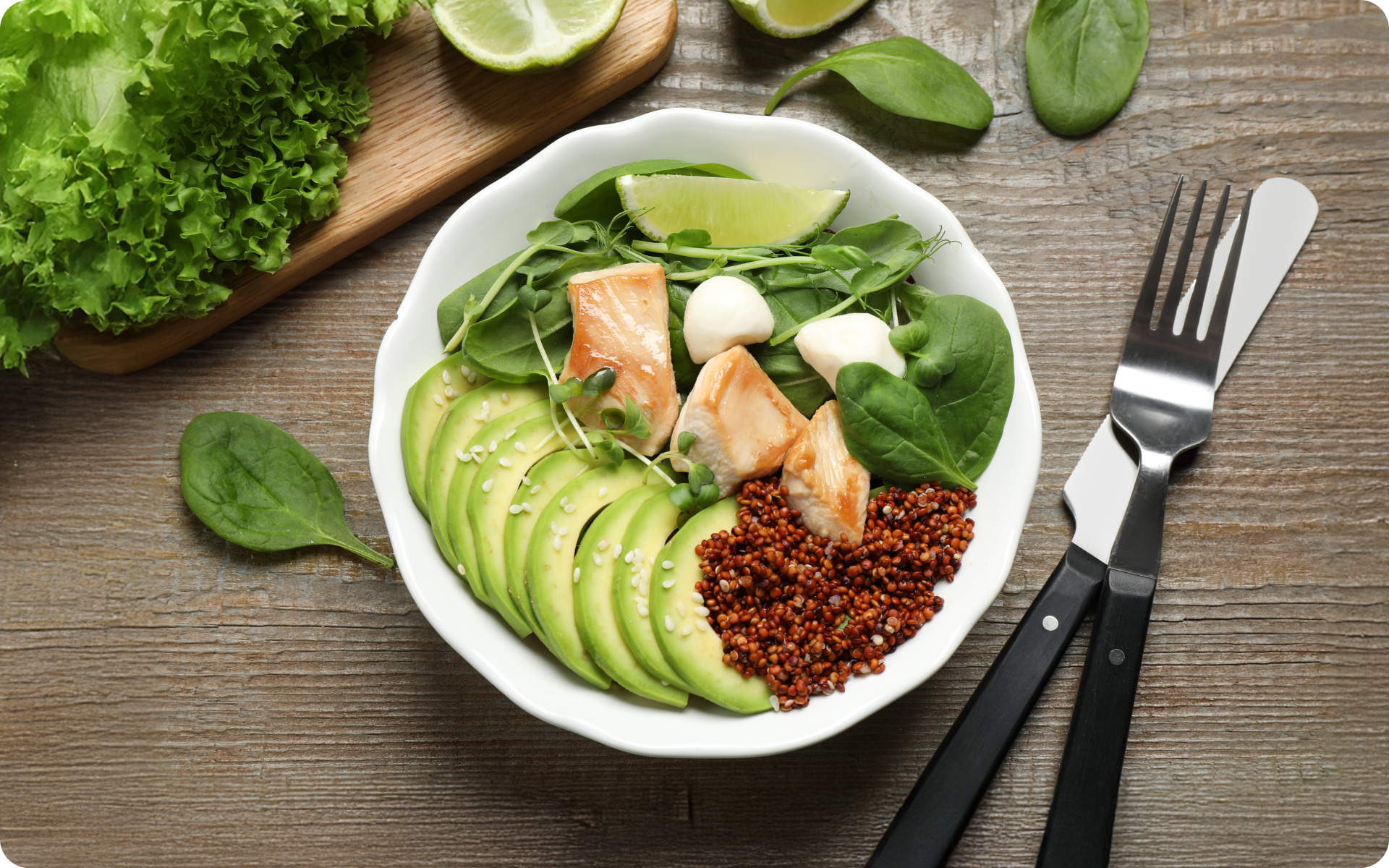Weight loss diets have become incredibly popular over the years with most celebrities swearing that their favorite diets can help you lose weight fast. However, weight loss is a more complex concept than the internet makes it seem. It requires you to create a calorie deficit diet.
As a rule of thumb, if you reduce your calories to approximately 500 per day fewer than you expend, you should theoretically lose approximately 1 pound per week (15).
How many meals do you need to eat a day? Is snacking necessary for weight loss? Will spreading your calories over 3 meals work or is it another weight loss myth?
We’re about to take a closer look at the 3-meal-a-day diet no snacks benefits, how it contributes to weight loss, and health tips.
What Is The 3-Meals-a-Day Myth?
The 3-meals-a-day concept involves eating 3 meals: breakfast, lunch, and supper. There is no research that supports the claim that you should eat 3 meals a day – it is simply a cultural norm that has been accepted and stuck through the years.
However, there is some scientific evidence that shows the benefits of eating a few larger meals, which is the case in the 3-meals-a-day diet, and avoiding excessive snacking.
Are Smaller, More Frequent Meals Better?
Some claim that eating 5 to 6 small meals throughout the day helps promote weight loss by kickstarting your metabolism. Research has shown that there is no significant difference between eating frequent small meals and fewer larger meals (13) (16).
The basic principle of weight loss is reducing your calorie intake while increasing your calorie expenditure to create a calorie deficit situation (9).
This principle applies regardless of the weight loss method or diet you follow. This means that if you eat small frequent meals that consist of calorie-dense foods and don’t exercise, it’s unlikely that you’ll lose weight. You may even gain some weight instead.
BetterMe is your fast-track ticket to a long-lasting weight loss! Tailor your fitness journey and maximize your results with just a couple of swipes!
What About Healthy Snacks to Lose Weight?
Snacking refers to the consumption of any food or drink in between main meals. Research on whether snacking promotes weight loss or not is controversial.
Most studies show that snacking has no significant effect on weight loss one way or another (12) (21). However, some studies have suggested that eating snacks that are high in protein may promote weight loss (22).
For example, a study from 2010 found that for diabetic people, eating snacks that were rich in protein and with a low glycemic index resulted in a 1 kg reduction in body weight in 4 weeks (4).
Some research has suggested that snacking may result in either slower weight loss or weight gain (2) (y).
Snacking may elicit different effects due to differences in timing and snack types. Healthy satiating snacks may help promote weight loss, while processed snacks that are filled with sugar or salt and high in calories may increase overall calorie intake and cause weight gain (j).
The 3-meals-a-day diet requires you to strictly eat 3 meals with no snacks in between. So, if you opt for this diet, you’ll have to forego any weight-loss snacks.
Other weight loss diets allow snacks. Should you opt for such a diet, make sure to eat satiating and nutrient-dense snacks such as hard-boiled eggs, homemade trail mix, celery or carrot sticks with Greek yogurt or hummus, and light fruit and vegetable salads.
What Are The Benefits of Eating 3 Meals a Day?
Here are the potential benefits of a 3-meals-a-day no snacks diet:
Reduced Risk of Diabetes
Diabetes is one of the most common chronic diseases. It is a lifelong disease that occurs when the body underproduces insulin (the hormone that regulates blood glucose levels). It also occurs when the body becomes resistant or insensitive to insulin and cannot effectively use the hormone (5).
Eating 3 times a day may reduce the risk of type 2 diabetes.
A study that was conducted in 2012 found eating 1-2 meals a day to be associated with an increased risk of type 2 diabetes in comparison to eating three a day. The same study also found skipping breakfast to be associated with an increased risk of type 2 diabetes (6).
Skipping breakfast may somehow contribute to insulin resistance (19). This means that a higher amount of insulin is required to bring down blood glucose levels as the body is no longer sensitive to normal amounts of insulin. When this condition worsens over time, there’s a higher risk for type 2 diabetes.
Weight Management
Research on whether a higher or lower meal frequency promotes weight loss is controversial. Some studies support eating fewer, larger meals, whereas others support frequent smaller meals.
However, a regular meal pattern and reduced meal frequency (2-3 meals per day) may be associated with health benefits such as reduced inflammation, increased autophagy, modulation of gut microbiota, and improved circadian rhythm (25).
A study of middle-aged men and women found a high eating frequency to be associated with a healthy lifestyle and reduced likelihood of central obesity. A low daily eating frequency was found to be associated with higher alcohol consumption, smoking, and lesser physical activity (1).
Other studies have shown that eating 1 to 2 times a day with regular timing is associated with a reduction in BMI in comparison to eating 3 times daily (17).
These mixed results suggest that other factors are probably more important than the number of times you eat per day. What likely influences weight management more is what and how much you eat, and other lifestyle factors such as activity, stress, sleep, and alcohol consumption.
Read more: 16 Vegan Alternatives for Cheese to Transform Any Meal You Crave
Can Eating Only 3 Meals a Day Help You Lose Weight?
Eating 3 meals a day can help you lose weight if you do it right. If you eat 3 satisfying meals a day, you’re likely to eat fewer calories. It’s also relatively easy to plan your meals and track your calorie intake.
Approximately 13% of the world’s adult population is obese. Obesity is a major risk factor for heart disease, type 2 diabetes, and certain cancers such as breast, kidney, liver, prostate, and ovarian (20). Therefore, carrying too much weight can be harmful to your health.
Luckily, reducing your calorie intake while exercising to increase your calorie expenditure helps with weight loss. Eating 3 meals a day can help you achieve:
Improved Satiety
Increased meal frequency (eating more than 3 meals per day) is sometimes said to reduce hunger, increase metabolism, improve insulin control, and reduce body weight. However, most studies suggest that increased eating frequency has no significant (minimal) effect on appetite and food intake (24).
Some research has shown that eating three meals a day (compared to several meals) may help improve metabolic rate and appetite control (7). This will help prevent overeating and help you watch your calorie intake.
Lower Body Mass Index (BMI)
Body mass index is a measure that is based on a person’s height and weight. A BMI of 18.5 to 24.9 is considered the healthy weight range, while a BMI of 25 to 29.9 falls in the overweight range. If your BMI is 30 or higher, you’re considered obese (3).
When it comes to eating 3 meals a day, some studies have linked a lower eating frequency (once or twice) to a reduction in BMI. One study also suggests that eating less, eating breakfast, and no snacking may be effective for long-term weight management (17).
A key consideration in meal frequency is macronutrient quality. Studies have linked the consumption of protein by overweight individuals to weight loss. Protein helps build muscle mass, decrease levels of the hunger hormone ghrelin, and increase thermogenesis (14).
Reduced Stress
When you adapt to the 3-meals-a-day diet, you’ll need to plan your meals ahead of time. When you have a meal plan, you won’t need to worry about what food to eat and when to go grocery shopping as you’ll already have worked out the details. Doing this will help reduce decision fatigue and stress.
Stressing is counterproductive as high levels of stress can result in unnecessary weight gain. The stress hormone plays a key function in the regulation of appetite, body composition, and fat and carbohydrate metabolism. In excess, this hormone increases your appetite and cravings, which results in overeating and eventually leads to weight gain (23).
Therefore, it can be concluded that eating frequency does not have a profound effect on weight loss. However, meal timing and macronutrient quality appear to have a significant effect.
For better results, try these weight loss tips together with the 3-meals-a-day diet.
- Get more active. Find a simple activity you love, such as swimming, running, or walking.
- Use a smaller plate to help you eat smaller portions.
- Cut back on alcohol as it contains a lot of empty calories.
- Don’t have any snacks such as chocolate, crisps, and biscuits at home.
- Avoid thinking of food as either good or bad. Don’t starve yourself, as your body requires energy to function.
- When eating out, always ask for a side of vegetables and avoid excessive sauces and condiments.
- Always make time for breakfast. It’s a myth that skipping breakfast promotes weight loss.
- Increase your fruit and vegetable intake. Make them half your plate at each meal.
- Remember to read food labels. Avoid brands with too much sodium and saturated fats. For example, go for water-canned fish instead of oil-packed fish to cut out some excess calories.
If you’ve mustered up the courage to crush your weight loss goal, let Betterme take the sting out of this demanding process. Our app will help you restructure your habits, remold your life and crank up your fitness results!
How to Eat 3 Meals a Day
The most important factors when it comes to meal planning for weight loss are calorie amount and meal quality. All 3 meals should be balanced, satiating, and filled with the essential nutrients. You’re advised to track your calories. For this, you can use an app or a food journal to do this.
Avoid the consumption of too many high-calorie and ultra-processed foods. Eat when you’re hungry, not because it’s routine or due to the availability of foods or snacks.
Eat mindfully by taking time to properly check your food and appreciate its taste (18). You may also want to try drinking water an hour before your meal as water is a natural appetite suppressant (11).
A lot of data has been collected relating to meal timing. Studies have shown that eating breakfast regularly may aid in weight loss by reducing total energy intake during the day (8). Others have suggested that eating later in the evening close to bedtime may negatively affect weight loss (26).
Below are some tips to help you plan your meals:
Breakfast
- Incorporate protein, complex carbs, healthy fats, vegetables, and fruits.
- Eat more fiber-rich foods as you’ll remain full for longer.
- When choosing cereal, opt for those that are high in fiber and low in sugar.
- Whole-grain products such as whole-grain waffles, whole-grain muffins, and whole-wheat bread.
- Opt for low-fat dairy products such as low-fat cheese, milk, butter, and Greek yogurt.
- When you don’t have time to prepare a full breakfast meal, opt for fruit and vegetable smoothies.
- Peanut and other nut butters are rich sources of protein.
- Minimize added sugar, including alternatives such as honey.
- If you can, bake your pastries at home so that you can track your calories.
- You can also eat vegetables for breakfast.
Lunch and Supper
These should also be a balanced diet with all 3 macros and vegetables or fruits.
- Always have a side of vegetables – boiled, roasted, or sautéed. Include colored vegetables such as summer squash, tomatoes, asparagus, and bell peppers.
- Salads are a simple way to add more vegetables and fruits to your diet.
- Limit your salt intake.
- Choose complex carbs such as brown rice, whole wheat, and quinoa instead of refined carbs such as white rice or refined grains.
- Eat protein from plant sources such as beans, peas, or lean meats as they help build muscle mass.
- Incorporate oily fish. They are a rich source of omega-3 fatty acids and amino acids.
- Opt for healthy fats such as avocado and olive oil instead of mayonnaise and butter.
- Replace sodas, energy drinks, and other sugary drinks with water and fresh fruit juices.
Here is a sample 1,500-calorie 3-meals-a-day diet meal plan for 3 days:
Day 1
- Breakfast: 1 serving of banana peanut butter chia pudding with 2 slices of whole-wheat toast (404 calories)
- Lunch: 1 serving of quick salsa tuna wrap with 1 serving of carrots with hummus (547 calories)
- Supper: 2 servings of mozzarella and hummus on multigrain flatbread with 2 servings of fried broccoli (543 calories)
Nutritional info: 1,494 calories, 137.4g carbs, 108.1g protein, 66.4 g fat, 44.8g fiber
Day 2
- Breakfast: 1 sausage and egg breakfast sandwich with 1 medium apple (552 calories)
- Lunch: 1 serving of onigiri balls (382 calories)
- Supper: 1 serving of leftover mashed potato quesadilla with 1 serving of steamed broccoli
Nutritional info: 1,500 calories, 194.8g carbs, 61.8g protein, 52.4g fat, 20.9g fiber
Day 3
- Breakfast: 1 serving of peanut butter protein oats (390 calories)
- Lunch: 2 servings of big bad bean burritos (489 calories)
- Supper: 1 serving of roasted salmon and 2 servings of steamed broccoli with olive oil and Parmesan (620 calories)
Nutritional info: 1,499 calories, 118g carbs, 96.2g protein, 78.2g fat, 36.8g fiber
Read more: Why Stop Eating Oatmeal – A Breakfast Revolution
FAQs
Can you lose weight by not eating snacks?
Cutting out snacks can result in weight loss, but it’s not necessary and may even be counterproductive. You should focus on making healthier snack choices and practicing moderation, and you can still achieve your weight loss goals without depriving yourself.
A common misconception about weight loss is that you need to completely cut out all snacks in order to see results. While this may work for some people, it’s not necessary and can actually be detrimental to your overall health and weight loss journey.
It’s important to understand that snacking itself is not the issue when it comes to weight gain. It’s the type and amount of snacks you consume that can lead to unwanted weight gain. Snacking on healthy, nutrient-dense foods such as fruits, vegetables, and nuts can actually help with weight loss by providing your body with essential vitamins and minerals.
At the same time, snacking on processed and high-calorie foods such as chips, cookies, and candy can quickly add up in terms of calories. This can lead to exceeding your daily calorie goals and ultimately result in weight gain.
In addition, completely cutting out snacks from your diet can lead to feelings of deprivation and cravings for unhealthy foods. This can potentially result in binge-eating and a negative relationship with food.
Rather than completely eliminating snacks, you should focus on making healthier snack choices and practicing portion control. In this way, you can still enjoy the occasional treat without sabotaging your weight loss efforts.
It’s also important to listen to your body’s hunger cues. If you find yourself constantly snacking out of boredom or emotion rather than true hunger, it may be helpful to find other activities to engage in rather than reaching for a snack.
Our Weight Loss Low-Carb Diet guide has helpful tips and tricks for making healthier snack choices that can aid in weight loss.
How many meals a day should you eat to lose weight?
You should eat as many (or as few) meals a day as is comfortable and sustainable for you. Some people prefer three large meals, while others achieve success with smaller, more regular meals. The key is finding what works best for your body and lifestyle.
A close link between eating frequency and weight loss has been identified in many studies, but the results are inconclusive. While some studies have suggested that eating multiple small meals throughout the day can increase metabolism and help with weight loss, others have suggested that there is no significant difference in weight loss between those who eat three large meals versus those who eat multiple small meals.
Ultimately, what matters most for weight loss is your overall calorie intake. Whether you choose to eat three larger meals or five smaller ones, as long as you’re in a calorie deficit (burning more calories than you consume), you’ll lose weight.
Is it better to eat 3 meals a day or snack?
It’s probably better to eat 3 square (or well-balanced) meals a day rather than snack constantly. This is because snacking can sometimes lead to mindless eating and consuming more calories than you need, particularly if your snacks are not nutrient-dense and balanced.
When you have set meal times, it allows you to be more mindful of your food choices and portion sizes. This is not to say that all snacks are unhealthy, but they should be treated as a supplement to your main meals rather than a replacement.
Check out our Intermittent Fasting Guide to learn more about meal timing and why it matters
Is it OK to eat the same meal 3 times a day?
It’s okay to eat the same meal 3 times a day if it matches your overall calorie and nutrient needs. However, it’s important to have a variety of foods in your diet to ensure you get all the essential nutrients you need for optimal health.
Eating the same meal multiple times a day can also lead to food boredom, making it more difficult to stick to a healthy eating plan in the long term.
Why is eating 3 meals a day bad?
While it isn’t a problem for most people, eating 3 meals a day may be considered bad if the meals are unhealthy and lack important nutrients. It’s also not ideal if it results in you eating more calories than your body needs.
If you find that eating 3 meals a day leaves you feeling overly full, uncomfortable, or unsatisfied, it may be beneficial to explore different meal timing options. Some people do better with smaller, more frequent meals.
We’ve compiled a guide – Meals Under 300 Calories – to illustrate that healthy, filling meals don’t need to be high in calories.
The Bottom Line
Diets are an integral aspect of weight loss. As you need to create a calorie-deficit diet, you’ll definitely need to reduce the number of calories you consume each day. The required calorie intake is dependent on several factors such as age, sex, height, and level of physical activity.
Eating the 3 main meals of breakfast, lunch, and supper is a daily norm. When it comes to weight loss, observing your daily calorie allowance and eating high-quality nutrient-dense meals is more important. That being said, while following the 3-meals-a-day diet no snacks, you should ensure you properly plan your meals, eat nutrient-dense foods, and drink plenty of water.
DISCLAIMER:
This article is intended for general informational purposes only and does not serve to address individual circumstances. It is not a substitute for professional advice or help and should not be relied on for making any kind of decision-making. Any action taken as a direct or indirect result of the information in this article is entirely at your own risk and is your sole responsibility.
BetterMe, its content staff, and its medical advisors accept no responsibility for inaccuracies, errors, misstatements, inconsistencies, or omissions and specifically disclaim any liability, loss or risk, personal, professional or otherwise, which may be incurred as a consequence, directly or indirectly, of the use and/or application of any content.
You should always seek the advice of your physician or other qualified health provider with any questions you may have regarding a medical condition or your specific situation. Never disregard professional medical advice or delay seeking it because of BetterMe content. If you suspect or think you may have a medical emergency, call your doctor.
SOURCES:
- A high eating frequency is associated with an overall healthy lifestyle in middle-aged men and women and reduced likelihood of general and central obesity in men (2010, cambridge.org)
- A Higher Meal Frequency May be Associated with Diminished Weight Loss after Bariatric Surgery (2009, ncbi.nlm.nih.gov)
- Assessing Your Weight (2020, cdc.gov)
- Chronologically scheduled snacking with high-protein products within the habitual diet in type-2 diabetes patients leads to a fat mass loss: a longitudinal study (2011, biomedcentral.com)
- Diabetes Mellitus (2021, ncbi.nlm.nih.gov)
- Eating patterns and type 2 diabetes risk in men: breakfast omission, eating frequency, and snacking (2012, academic.oup.com)
- Effects of Meal Frequency on Metabolic Profiles and Substrate Partitioning in Lean Healthy Males (2012, ncbi.nlm.nih.gov)
- Energy intake at breakfast and weight change: prospective study of 6,764 middle-aged men and women (2008, pubmed.ncbi.nlm.nih.gov)
- Fat loss depends on energy deficit only, independently of the method for weight loss (2007, pubmed.ncbi.nlm.nih.gov)
- Hypercaloric diets with increased meal frequency, but not meal size, increase intrahepatic triglycerides: A randomized controlled trial (2014, onlinelibrary.wiley.com)
- Increased Hydration Can Be Associated with Weight Loss (2016, frontiersin.org)
- Increased meal frequency does not promote greater weight loss in subjects who were prescribed an 8-week equi-energetic energy-restricted diet (2009, cambridge.org)
- Increased meal frequency does not promote greater weight loss in subjects who were prescribed an 8-week equi-energetic energy-restricted diet (2010, pubmed.ncbi.nlm.nih.gov)
- Increased protein intake and meal frequency reduces abdominal fat during energy balance and energy deficit (2013, onlinelibrary.wiley.com)
- I want to lose a pound of weight. How many calories do I need to burn? (n.d., nal.usda.gov)
- Meal frequency and energy balance (1997, pubmed.ncbi.nlm.nih.gov)
- Meal Frequency and Timing Are Associated with Changes in Body Mass Index in Adventist Health Study 2 (2017, sciencedirect.com)
- Mindful Eating: The Art of Presence While You Eat (2017, ncbi.nlm.nih.gov)
- Nibbling versus gorging: metabolic advantages of increased meal frequency (1989, pubmed.ncbi.nlm.nih.gov)
- Obesity and overweight (2021, who.int)
- Should snacks be recommended in obesity treatment? A 1-year randomized clinical trial (2007, nature.com)
- Snack Food, Satiety, and Weight (2016, sciencedirect.com)
- Stress and Obesity: Are There More Susceptible Individuals? (2018, link.springer.com)
- The Effect of Eating Frequency on Appetite Control and Food Intake: Brief Synopsis of Controlled Feeding Studies (2011, sciencedirect.com)
- The Influence of Meal Frequency and Timing on Health in Humans: The Role of Fasting (2019, mdpi.com)
- Timing of food intake predicts weight loss effectiveness (2013, nature.com)










